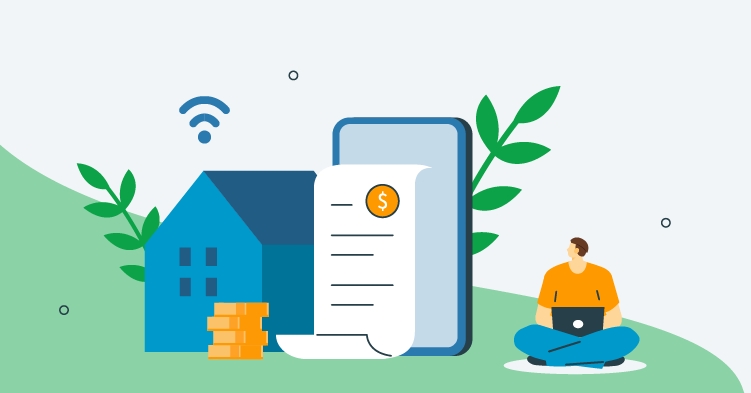Need Help Paying Bills: Where To Go for Assistance ASAP
Sometimes you find yourself behind. Maybe it was a surprise expense. Maybe a check fell through. Either way, the bills are due and you need help.
So where do you go?
If you need to cover your bills ASAP, don’t panic. There are a number of government programs that offer financial assistance for those eligible. If you have time, consider a strategy for longer term solutions — boosting income or reducing expenses. Borrowing is another possibility, but it should be considered as a last option because it will add to your costs in the long run.
Here are some resources to help.
Financial Assistance To Pay Bills ASAP
If you have bills that you need to take care of right away, government financial assistance programs and nonprofit organizations can help those eligible at every level. You can search online for assistance programs in your local area or find help from state and federal sources.
One program that offers immediate assistance with utility bills is the Low-Income Home Energy Assistance Program. Also known as LIHEAP, this program provides utility assistance to homeowners and renters by making direct payments to utility companies. They can even help you reduce the cost of weatherization, home repairs and improvements that can make your home more energy efficient and help keep the energy bills low.
For Neighborhood Trust customers, try our partner SpringFour to search for assistance. Their database can connect you with trusted local resources to help with food, electric bills, other utilities, prescriptions and unemployment resources.
Ongoing Financial Assistance
Ongoing support can help supplement the cost of bills ranging from groceries to health care to housing. A number of government agencies offer support for those eligible.
- Food assistance. Look into programs like the Supplemental Nutrition Assistance Program (SNAP) that offer food stamps. Each state may have different requirements for eligibility, but food assistance can help you ensure that you can continue to provide healthy meals for your family.
- Temporary Assistance. Temporary Assistance for Needy Families (TANF) provides financial assistance designed to help low-income families while they get back on their feet. It’s provided by the state and eligibility requirements may vary.
- Health care. Insurance is a must. We don’t like to think about it, but we could have an emergency at any time. If you don’t have insurance, you’re probably going to be faced with some hefty medical bills. Check out HealthCare.gov to search for providers and see your insurance options.
- Prescriptions. A big (and sometimes costly) part of medical care are prescriptions. There are things you can do to lower the cost of medicine you need.
- Housing. You may qualify for rental assistance or mortgage payment assistance through your state’s social services. You may also qualify for housing choice vouchers through the Department of Housing and Urban Development (HUD). You can also use their site to find affordable housing options.
Extra Income
If you need some extra cash to ensure you can make your bill payments, you can also try finding opportunities to boost your household income. You can find flexible part-time work online and in your communities. Here are some ideas.
- Work for a local business. Local businesses are often looking for helping hands, plus you can align it to the things you like to do. If you love to read, you can look for local bookstores, if you love fashion you can find a small boutique. Think about what you like to do and look for opportunities in your area.
- Pet sitting or dog walking. People are always looking for someone trustworthy to help them care for their pets. If you love animals or you have a flexible schedule this can be a fun and lucrative side hustle. There are a ton of websites and apps where you can offer your services.
- Drive for a ride-sharing app or delivery service. If you have a car, you can take advantage of this flexible opportunity. You can set your own hours and work when you want. Just make sure your insurance offers sufficient coverage.
- Work online. With the new trend of remote work, there are a lot of companies looking for all types of assistance. You can find online opportunities including freelance work, virtual administration and even bookkeeping.
Budgeting Strategies
Budgeting doesn’t need to be intimidating. It’s easier than a lot of people think — and it can free up money to help you pay your bills. Here are some strategies you can try.
- Pay yourself first. One of the biggest rules in personal finance is to pay yourself first. As soon as you get paid you should take a little bit and put it into a savings account. Ideally this should be about 10% of what you make, but that’s not always realistic. Put in whatever you’re able, even if it’s just $5 a paycheck.
- Create an emergency fund. The first savings account you should build with the pay yourself first rule is your emergency fund. A lot of finance folks will tell you that you need to save enough to cover three to six months of expenses, but that can be a big goal to start out with. Aim to save about $500 – $1,000. This way you have an extra resource you can tap into when those surprise bills or emergencies pop up. You’ll be doing better than 68% of Americans.
- Assess your current budget. When you set up your budget, you should ensure that you’re able to cover your basic needs, bills and savings first. Figure out what you’re bringing home each month, and then subtract your monthly expenses: housing, food, utility bills, transportation, etc. Then subtract your savings. If you’re earning less than your spending, it’s time to either boost your income or reduce your expenses. If you’ve got some left over, you can add it to your savings or treat yourself to something special every now and then!
- Keep track of your spending. One strategy that works well is to track your daily spending in a notebook or on your phone. It can help you to understand where your dollars are going and empowers you to decide if that aligns with your goals and values. When you know what you’re working towards, it can be easier to give a job to every dollar in your pocket and make it work for you.
Borrowing Options
Sometimes there’s a rough patch and you don’t feel like there’s another way out. Expenses pop up out of nowhere, your car breaks down, there is a family emergency or you lose your job. Still, borrowing money to pay your bills should be a last resort. While they can be a lifeline in the short term, you’re ultimately adding another bill that will need to be paid later. Consider asking friends or family for help or pursue a different strategy.
If you decide to borrow money to help with your bills, here are some options.
- Installment loans. Personal installment loans provide you with a lump sum of cash up front. You can use this cash to help cover your expenses and get back on track. When it comes time to pay the loan back, your repayments will be broken up into smaller chunks that you pay back over time.
- Personal lines of credit. A personal line of credit is a revolving line of credit that works a bit like a credit card — except you can use the funds like cash. You’ll be given a credit limit, and you can borrow up to that amount whenever you need. It can be handy for keeping an extra source of cash on hand when you need a boost.
- Payday loans. Payday loans are small, short-term loans designed to help get you through to your next payday. You’ll be given cash up front, and you’ll need to repay in full when the term is up. The term is usually pretty short (about 2 weeks, or your next payday). This can lead to a loan rollover and some hefty fees. You may want to consider alternatives to payday loans.
- Title loans. If you own a vehicle, you can use it as collateral to back a loan. You’ll receive cash upfront that will need to be repaid in full at the end of the term (usually about 30 days). But if you default on the loan, the lender has the right to seize and sell your car to recoup their money.
- Pawn shop loans. A pawn shop loan is similar to a title loan, but instead of using your car as collateral, you can use any item of value. These loans are typically for much smaller amounts and will need to be repaid in full. If you fail to repay the shop can sell your item to make their money back.




